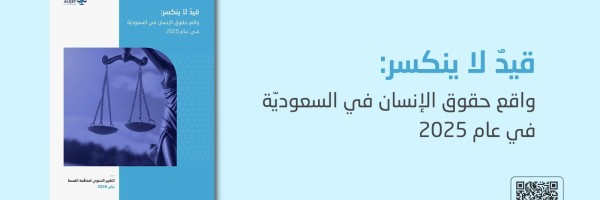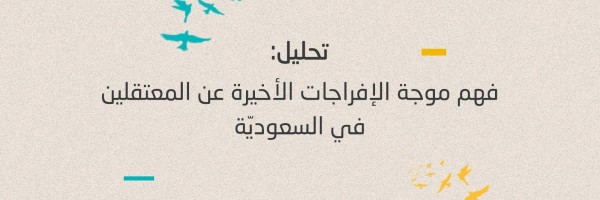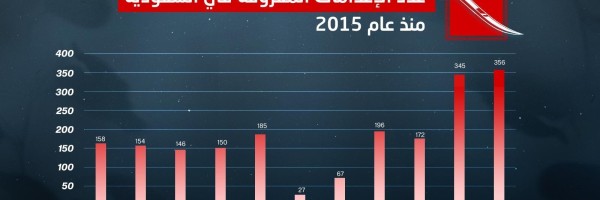ALQST and other human rights organisations have frequently published details of arbitrary arrests and rights violations carried out against human rights activists, advocates for reform, independent writers and social media activists, whom the Saudi authorities have long sought to silence and deprive of their rights to free speech and freedom of assembly. The authorities want to ensure there is no criticism of their constant abuses and provocative actions towards all segments of the population, such as the brutal murder of the journalist Jamal Khashoggi; the successive deaths in prison of prominent social and political figures like Dr Abdullah al-Hamid; the tragic consequences of the war in Yemen and the Saudi violations taking place there; and the brutal torture and sexual harassment of several activists, both male and female, in addition to acts of political and economic recklessness that have had a heavy impact on ordinary Saudi citizens, along with a general squandering of resources and the monopolisation of power.
Meanwhile, however, such arrests, torture and enforced disappearances have not been confined to activists and reformers alone. Since King Salman bin Abdulaziz came to the throne on 23 January 2015, and particularly since his son Mohammed bin Salman became crown prince on 21 June 2017, the forces of repression have started to target a new class of victim, too, and committed numerous violations against them.
The Saudi authorities have carried out successive waves of mass arrests, most notably on 10 September 2017, when they swept up a group of prominent clerics supportive of reform and human rights, as well as academics, intellectuals and journalists like Dr Salman al-Odeh, Abdullah al-Malki and others. Further sweeping waves of arrests followed, including one on 4 November 2017 in which, under the banner of “combating corruption”, numerous government officials, princes and businessmen were detained in the Ritz-Carlton hotel in Riyadh without any regard for or compliance with due legal or judicial process. The authorities subsequently released a number of them after reaching what they called “settlements”, and said some of them had been innocent. Several of the detainees, however, were apparently arrested for objecting to Mohammed bin Salman’s assumption of certain key positions: the authorities accused several of them of corruption, but Mohammed bin Salman accused a number of them of plotting to oust him.
These arbitrary arrests and the accompanying gross violations continued unabated, and the Saudi authorities continued to endanger the lives of many detainees by subjecting them to severe beatings or torture, or denying them their fundamental rights to healthcare and medical treatment.
Among those caught up in the crackdown were Basma bint Saud Al Saud, Salman bin Abdulaziz bin Salman bin Mohammed Al Saud, and Salman’s father Abdulaziz Al Saud.
Salman Al Saud was arrested on 4 January 2018 after a meeting to which he and his father had been invited by the Emirate of Riyadh Province. It was attended by dozens of male members of the Saudi ruling family, the Al Saud, who had been summoned by night to a meeting that went on until morning. Several of those gathered there were accused of having links with Turki bin Mohammed bin Saud al-Kabeer. Also present at the meeting was the crown prince’s adviser at the time, Saud al-Qahtani, together with a number of masked men and soldiers – and this was two days before the authorities announced the formation of a special force reporting to Crown Prince Mohammed bin Salman. Salman bin Abdulaziz was beaten and tortured that day in front of the rest of the gathering by this force accompanying Saud al-Qahtani. Some of those present were accused of taking part in meetings and pacts aiming to depose Mohammed bin Salman as crown prince, and sharing these ideas with people abroad hoping they would help them. Shots were fired inside the palace, but it is not known whether they were fired at anyone or simply warning shots; then Salman and 10 of the other attendees were arrested. On 6 January the authorities announced the formation of the “Al-Ajrab (Blood-rusted) Sword” Brigade.
Salman and some of the others had been so badly beaten and tortured at the hands of the masked men accompanying Saud al-Qahtani inside the palace that they could not stand or walk unaided, and were carried out of the palace to detention in the Ritz-Carlton hotel, where Salman received medical treatment for two weeks.
The following day, 5 January, Salman’s father Abdulaziz bin Salman Al Saud phoned some people in Europe, including a French lawyer living in Paris, seeking their help in securing his son’s release. That same day, Abdulaziz’s home in the Al-Nakheel district of Riyadh was raided by a large squad of heavily armed men. They destroyed the house’s CCTV cameras before arresting him and seizing a number of devices from his house, accusing him of being in communication with foreign entities, and then taking him away to put him in detention.
After two weeks, Salman was transferred to Al-Ha’ir Prison and held incommunicado for seven months, during which he was subjected to enforced disappearance. He spent nearly a year in Al-Ha’ir before being transferred, with his father, in early 2019 to detention in a private villa belonging to the authorities. On 28 March 2020 Salman was taken by masked men from the detention villa and moved to an unknown location, to be forcibly disappeared again for a further two months before being returned to his father at the end of May. He and his father are still being held in the Saudi authorities’ villa.
A number of prominent figures and organisations have been in contact with the Saudi authorities seeking the release of Salman and his father, and an end to the abuses he is suffering, including members of the European Union who have shown concern over the men’s detention. Salman’s lawyer has also contacted the French authorities, and MENA Rights Group and ALQST have submitted a complaint on behalf of Salman and his father to the Special Procedures of the UN Human Rights Council in Geneva, asking for the Saudi authorities to cease their violations against the two men.
Meanwhile, Basma bint Saud Al Saud was taken from her home in Jeddah to Riyadh on 1 March 2019, having been informed that Crown Prince Mohammed bin Salman wished to meet with her. However she was taken to Riyadh, and straight to Al-Ha’ir Prison, together with her daughter Suhoud, without meeting the crown prince. After her arrest Basma was subjected to enforced disappearance for more than a month, and was unable to contact her family until April 2019. During this time she was denied the healthcare she needed for a potentially life-threatening condition that she suffers from. The authorities rejected every attempt by her family by whatever means to secure her release or ensure she received treatment.
It was more than a year after her arrest, at the beginning of Ramadan 1441 (23 April 2020) that news of her detention and ordeal was published on her verified Twitter account. Two days later, the account was hacked and the tweets were deleted. On 27 April the account was recovered and the tweets were reposted, but there has been no contact with Basma herself since 21 April, when she was stopped from making calls, and there has been no reply to this day to any enquiry about her whereabouts or health status. Basma is currently forcibly disappeared, and there are fears for her health deteriorating and being deliberately neglected by the authorities. At no point during her detention has any charge been levelled against her; in fact she has been told a number of times that there are no charges against her, and that she will be released soon. On 6 April 2020 a group of UN Special Rapporteurs and the Human Rights Council’s Working Group on Enforced Disappearances wrote to the Saudi authorities concerning the issue of Basma’s detention and the way she had been treated.
ALQST categorically rejects any violations of the rights of any member of society, and recognises the enormity of targeting whole segments of society with arbitrary arrest, torture, medical neglect, enforced disappearance, denial of fair trial, the bringing of invalid charges, the absence of justice and judicial independence, the suppression of any role for civil society, and attacks on all opponents without any regard for human rights.
ALQST calls for pressure on the Saudi authorities to cease these systematic violations and end the climate of impunity, and urges the global community to stop dealing with the Saudi authorities without paying heed to the massive deterioration in human rights that affects everyone, without exception, in Saudi Arabia.




